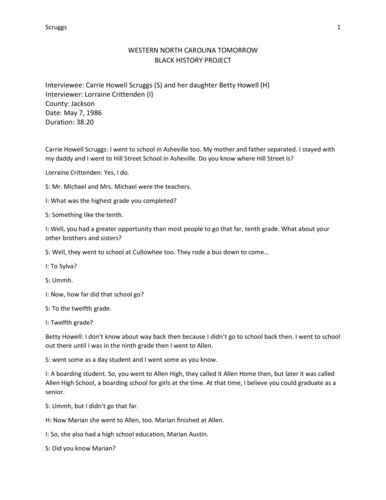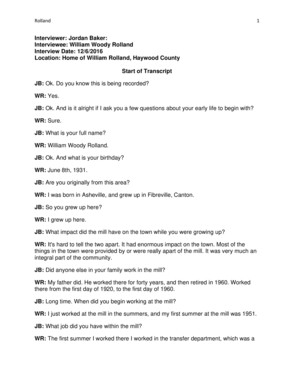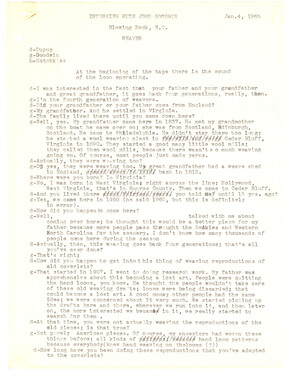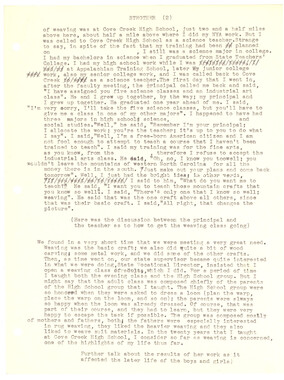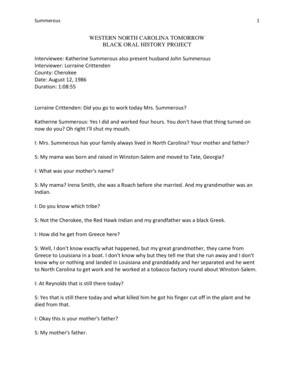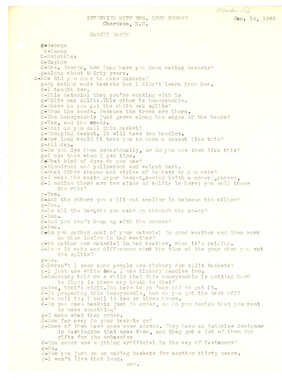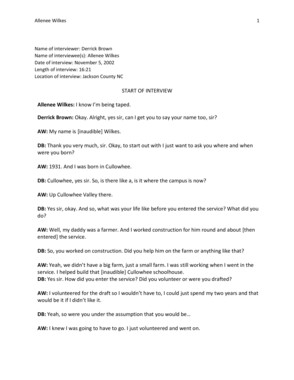Western Carolina University (20)
View all
- Canton Champion Fibre Company (2308)
- Cherokee Traditions (293)
- Civil War in Southern Appalachia (165)
- Craft Revival (1942)
- Great Smoky Mountains - A Park for America (2683)
- Highlights from Western Carolina University (430)
- Horace Kephart (941)
- Journeys Through Jackson (154)
- LGBTQIA+ Archive of Jackson County (15)
- Oral Histories of Western North Carolina (314)
- Picturing Appalachia (6679)
- Stories of Mountain Folk (413)
- Travel Western North Carolina (160)
- Western Carolina University Fine Art Museum Vitreograph Collection (129)
- Western Carolina University Herbarium (92)
- Western Carolina University: Making Memories (708)
- Western Carolina University Publications (2283)
- Western Carolina University Restricted Electronic Theses and Dissertations (146)
- Western North Carolina Regional Maps (71)
- World War II in Southern Appalachia (131)
University of North Carolina Asheville (6)
View all
- 1700s (1)
- 1860s (1)
- 1890s (1)
- 1900s (2)
- 1920s (2)
- 1930s (5)
- 1940s (12)
- 1950s (19)
- 1960s (35)
- 1970s (31)
- 1980s (16)
- 1990s (10)
- 2000s (20)
- 2010s (24)
- 2020s (4)
- 1600s (0)
- 1800s (0)
- 1810s (0)
- 1820s (0)
- 1830s (0)
- 1840s (0)
- 1850s (0)
- 1870s (0)
- 1880s (0)
- 1910s (0)
- Appalachian Region, Southern (15)
- Asheville (N.C.) (11)
- Avery County (N.C.) (1)
- Buncombe County (N.C.) (55)
- Cherokee County (N.C.) (17)
- Clay County (N.C.) (2)
- Graham County (N.C.) (15)
- Great Smoky Mountains National Park (N.C. and Tenn.) (1)
- Haywood County (N.C.) (40)
- Henderson County (N.C.) (5)
- Jackson County (N.C.) (131)
- Knox County (Tenn.) (1)
- Macon County (N.C.) (17)
- Madison County (N.C.) (4)
- McDowell County (N.C.) (1)
- Mitchell County (N.C.) (5)
- Polk County (N.C.) (3)
- Qualla Boundary (6)
- Rutherford County (N.C.) (1)
- Swain County (N.C.) (30)
- Watauga County (N.C.) (2)
- Waynesville (N.C.) (1)
- Yancey County (N.C.) (3)
- Blount County (Tenn.) (0)
- Knoxville (Tenn.) (0)
- Lake Santeetlah (N.C.) (0)
- Transylvania County (N.C.) (0)
- Interviews (314)
- Manuscripts (documents) (3)
- Personal Narratives (7)
- Photographs (4)
- Sound Recordings (308)
- Transcripts (216)
- Aerial Photographs (0)
- Aerial Views (0)
- Albums (books) (0)
- Articles (0)
- Artifacts (object Genre) (0)
- Biography (general Genre) (0)
- Cards (information Artifacts) (0)
- Clippings (information Artifacts) (0)
- Crafts (art Genres) (0)
- Depictions (visual Works) (0)
- Design Drawings (0)
- Drawings (visual Works) (0)
- Envelopes (0)
- Facsimiles (reproductions) (0)
- Fiction (general Genre) (0)
- Financial Records (0)
- Fliers (printed Matter) (0)
- Glass Plate Negatives (0)
- Guidebooks (0)
- Internegatives (0)
- Land Surveys (0)
- Letters (correspondence) (0)
- Maps (documents) (0)
- Memorandums (0)
- Minutes (administrative Records) (0)
- Negatives (photographs) (0)
- Newsletters (0)
- Newspapers (0)
- Occupation Currency (0)
- Paintings (visual Works) (0)
- Pen And Ink Drawings (0)
- Periodicals (0)
- Plans (maps) (0)
- Poetry (0)
- Portraits (0)
- Postcards (0)
- Programs (documents) (0)
- Publications (documents) (0)
- Questionnaires (0)
- Scrapbooks (0)
- Sheet Music (0)
- Slides (photographs) (0)
- Specimens (0)
- Speeches (documents) (0)
- Text Messages (0)
- Tintypes (photographs) (0)
- Video Recordings (physical Artifacts) (0)
- Vitreographs (0)
- WCU Mountain Heritage Center Oral Histories (25)
- WCU Oral History Collection - Mountain People, Mountain Lives (71)
- Western North Carolina Tomorrow Black Oral History Project (69)
- A.L. Ensley Collection (0)
- Appalachian Industrial School Records (0)
- Appalachian National Park Association Records (0)
- Axley-Meroney Collection (0)
- Bayard Wootten Photograph Collection (0)
- Bethel Rural Community Organization Collection (0)
- Blumer Collection (0)
- C.W. Slagle Collection (0)
- Canton Area Historical Museum (0)
- Carlos C. Campbell Collection (0)
- Cataloochee History Project (0)
- Cherokee Studies Collection (0)
- Daisy Dame Photograph Album (0)
- Daniel Boone VI Collection (0)
- Doris Ulmann Photograph Collection (0)
- Elizabeth H. Lasley Collection (0)
- Elizabeth Woolworth Szold Fleharty Collection (0)
- Frank Fry Collection (0)
- George Masa Collection (0)
- Gideon Laney Collection (0)
- Hazel Scarborough Collection (0)
- Hiram C. Wilburn Papers (0)
- Historic Photographs Collection (0)
- Horace Kephart Collection (0)
- Humbard Collection (0)
- Hunter and Weaver Families Collection (0)
- I. D. Blumenthal Collection (0)
- Isadora Williams Collection (0)
- Jesse Bryson Stalcup Collection (0)
- Jim Thompson Collection (0)
- John B. Battle Collection (0)
- John C. Campbell Folk School Records (0)
- John Parris Collection (0)
- Judaculla Rock project (0)
- Kelly Bennett Collection (0)
- Love Family Papers (0)
- Major Wiley Parris Civil War Letters (0)
- Map Collection (0)
- McFee-Misemer Civil War Letters (0)
- Mountain Heritage Center Collection (0)
- Norburn - Robertson - Thomson Families Collection (0)
- Pauline Hood Collection (0)
- Pre-Guild Collection (0)
- Qualla Arts and Crafts Mutual Collection (0)
- R.A. Romanes Collection (0)
- Rosser H. Taylor Collection (0)
- Samuel Robert Owens Collection (0)
- Sara Madison Collection (0)
- Sherrill Studio Photo Collection (0)
- Smoky Mountains Hiking Club Collection (0)
- Stories of Mountain Folk - Radio Programs (0)
- The Reporter, Western Carolina University (0)
- Venoy and Elizabeth Reed Collection (0)
- WCU Gender and Sexuality Oral History Project (0)
- WCU Students Newspapers Collection (0)
- William Williams Stringfield Collection (0)
- Zebulon Weaver Collection (0)
- African Americans (97)
- Artisans (5)
- Cherokee pottery (1)
- Cherokee women (1)
- College student newspapers and periodicals (4)
- Education (3)
- Floods (13)
- Folk music (3)
- Great Smoky Mountains National Park (N.C. and Tenn.) (1)
- Hunting (1)
- Mines and mineral resources (2)
- Rural electrification -- North Carolina, Western (2)
- School integration -- Southern States (2)
- Segregation -- North Carolina, Western (5)
- Slavery (5)
- Sports (2)
- Storytelling (3)
- World War, 1939-1945 (3)
- Appalachian Trail (0)
- Cherokee art (0)
- Cherokee artists -- North Carolina (0)
- Cherokee language (0)
- Church buildings (0)
- Civilian Conservation Corps (U.S.) (0)
- Dams (0)
- Dance (0)
- Forced removal, 1813-1903 (0)
- Forest conservation (0)
- Forests and forestry (0)
- Gender nonconformity (0)
- Landscape photography (0)
- Logging (0)
- Maps (0)
- North Carolina -- Maps (0)
- Paper industry (0)
- Postcards (0)
- Pottery (0)
- Railroad trains (0)
- Waterfalls -- Great Smoky Mountains (N.C. and Tenn.) (0)
- Weaving -- Appalachian Region, Southern (0)
- Wood-carving -- Appalachian Region, Southern (0)
- Sound (308)
- StillImage (4)
- Text (219)
- MovingImage (0)
Interview with Carrie Howell Scruggs and Betty Howell
Item
Item’s are ‘child’ level descriptions to ‘parent’ objects, (e.g. one page of a whole book).
-
-
Scruggs 1 WESTERN NORTH CAROLINA TOMORROW BLACK HISTORY PROJECT Interviewee: Carrie Howell Scruggs (S) and her daughter Betty Howell (H) Interviewer: Lorraine Crittenden (I) County: Jackson Date: May 7, 1986 Duration: 38:20 Carrie Howell Scruggs: I went to school in Asheville too. My mother and father separated. I stayed with my daddy and I went to Hill Street School in Asheville. Do you know where Hill Street is? Lorraine Crittenden: Yes, I do. S: Mr. Michael and Mrs. Michael were the teachers. I: What was the highest grade you completed? S: Something like the tenth. I: Well, you had a greater opportunity than most people to go that far, tenth grade. What about your other brothers and sisters? S: Well, they went to school at Cullowhee too. They rode a bus down to come… I: To Sylva? S: Ummh. I: Now, how far did that school go? S: To the twelfth grade. I: Twelfth grade? Betty Howell: I don’t know about way back then because I didn’t go to school back then. I went to school out there until I was in the ninth grade then I went to Allen. S: went some as a day student and I went some as you know. I: A boarding student. So, you went to Allen High, they called it Allen Home then, but later it was called Allen High School, a boarding school for girls at the time. At that time, I believe you could graduate as a senior. S: Ummh, but I didn’t go that far. H: Now Marian she went to Allen, too. Marian finished at Allen. I: So, she also had a high school education, Marian Austin. S: Did you know Marian? Scruggs 2 I: No, ma’am I didn’t S: Did you go there? I: Yes, ma’am S: Where do you live? I: I live in Forest Hill. S: In Asheville? I: No, in Cullowhee S: Oh, you do? I: Yes, ma’am. Now, I know that Allen is an excellent school or was an excellent school; therefore, do you feel that you had a better education than most black women? S: No, I don’t know that I had because I didn’t stay there that long, but I stayed a good while. I: What about your sister who finished there? S: Marian, yeah, she had a good education. I: Having had a higher degree of education were you all able to get better jobs? S: Well, I wasn’t because I worked for people. They pay you so much a day, something like that. I: You mean cleaning houses? S: Yeah. I: Washing and ironing. What about your sister Marian? S: Marian, she finished Allen, didn’t she? Did you know Marian? I: No ma’am. So, even though you could get a high school education that didn’t necessarily mean that you could get a better job. S: Right. I: What about your brothers? Were they able to go on to school? S: Yeah, they went if you could get them to go. I: There weren’t any strict guidelines about children attending school? S: Yeah, but children didn’t pay any attention if they wanted to lay out. H: They had truant officers. I: But not when your mother was growing up? S: Yeah, I think they did. I: So, if you decided that you didn’t want to go, that day you played hooky. Scruggs 3 S: Well, I always liked to go because I liked to be with my friends and have a good time. I: Well, what was school like? S: It was nice. I: Was it a one room building or what? S: Well, it was according to where you were. I went to Allen Home. H: Yeah, but mama you went mostly out here. I: What was this school like out here? S: Yeah, I think it was one room. I: Do you remember who the teacher was? S: Lord, I done forgot. Now, Henry Austin, my uncle was a teacher out there once. I done forgot all that stuff. I: Do you think because your mother and father both worked that your family was in a better economic position than some of the families in Jackson County? S: Well, no I don’t think so. I don’t think they were… I: You don’t think you had more of the material things than other families? S: Back then you done well to get some clothes and something to eat, something like that. I: Did your family own any land? S: Yeah, my mother owned land at Cullowhee I: Is it still there today? S: No, I think it’s been sold. I: Did your family own its own home? S: They did, yeah. I: Your mother and father? Now, was this generally the rule or did most people rent from someone else? S: Well, my mother was raised on the farm up there at Cullowhee across the river from Glennview going between here and Cullowhee. I: Ma’am, I said did most people rent their homes or did they own their homes? S: Well, they owned them, a lot of them owned them. I don’t know about everybody. I: Right, but did your parents? S: Yeah, my mother owned hers. I: What about down here in Sylva? So… they left Cullowhee and… Scruggs 4 S: No, my mother and father were separated. I: Okay. S: My mother and father separated. [tape stops and restarts] H: From Armour Leather Company, owned houses down there and they rented until they bought this one. I: Now, is that different from the tannery? H: That’s the same thing as tannery. I: So, they rented one of the company houses and then built this home here. H: Right. I: Was there a noticeable difference in the style of living between those who worked in the tannery and those who just had odd jobs? H: Yes, it was. I: Or worked on the farm. H: Well, they made in those days they called it “better” when they worked in the tannery, they made better money. S: They just made a living. I: But no one was doing too well? H: No, but they were average livers. I: Did any of them own cars? S: Yeah, my husband owned one. I: Did he work in the tannery? S and H: Yeah. I: So, you had a home and a car, so your living standard was about average then? H: Yes, compared to those days it was average. I: Now, what did you do Mrs.… S: I used to do day work. I: In Sylva? S: Ummh. Scruggs 5 I: Did you stay with any one family a long length of time? S: I stayed till I got tired and quit and that’s it [laughs]. I: Did you feel that you had to work? S: Well I worked up there at the college for a while. I: Did you? S: Yes. I: Then when you got tired of a job you just quit. S: Yeah. I: So, you would say you were not the sole support of this family? H: No, my daddy was working at the tannery. She could quite when she felt like it. I: That was a big difference. H: We didn’t want work too much. My brother and I, S: We just common people. H: We weren’t rich, but we had mostly what we wanted as toys and clothing. S: My husband always had some kind of [inaudible] I: Mrs. Howell, which historical events do you remember most? What in history do you remember the most? For example, do you remember the Depression? S: Yes, I remember it. I: What do you remember about it? S: People were just poor and didn’t have nothing much. I: Well, how did they survive? S: Well, they raised stuff and worked a little bit for different people. We had the relief. I: Do you remember the relief Mrs. Howell? S: Yeah, I kind of remember. I: I believe the food stamps were given and you could only get certain things with. S: Yes. I: Do you remember that? S: Yes. I: Well did your family have to go on relief? S: I don’t know whether they did or not. My mother owned the place at Cullowhee. They raised us. Scruggs 6 I: Did your husband lose his job during that time? S: I don’t believe he did, did he Betty? H: I don’t know, that was 1930 and I was born in 1930. I: Do you remember World War II? S: Yeah. I: Were you affected in any way by that? S: No. I: Were any of your brothers in the war? H: Sherman. I: Two of your brothers fought in the war? H: I don’t know about Edward, but Mr. Sherman did. I: Did he come back safe and sound? S: Yes. I: Did you participate in church? S: Do I? I: Did you when you were younger? S: Yes. I: What were some of the religious practices that you had then, but we don’t have them now? S: I don’t know only just walking to church and a lot of times people ride to church now. I: All right, but anything… S: My church is right by. I: When you were younger, what were Sundays like at church? S: In what way? I: Do you remember going to church all day on Sunday when you were younger? S: We didn’t go all day, we would go till down in the evening sometimes. We didn’t go all day. I: Did you go during the week? S: Yeah, prayer meeting. I: Prayer meeting on Wednesday night? S: I reckon, I done forgot, it’s been so long ago. Scruggs 7 H: They served food when they had big meetings outside. They make tables out of what you call saw horses. I: Now, would people come from, were these people just from Sylva or surrounding counties? H: Well, sometimes the churches would combine. I: Are you referring to what they call the May Meeting? H: I don’t know whether they call it the May Meeting then or what, but I know a lot of big meetings because they used to have it right out here. I: Do you remember the revivals from when you were younger? S: Yes. I: Are the revivals today like… S: Sometimes, no not…I converted to a Holiness Church. I: Oh, you were converted to the Holiness Church? S: In Asheville. I: In Asheville? Now were the services different? S: I think they are the same. They preached the same and prayed. I: Do you still belong to the Holiness Church now or to the Baptist Church? H: She goes to the Baptist Church. She was just converted there. I: What other practices do you remember that you had then but don’t have now? For example, I’m thinking about baptism. H: She was baptized I think in a river. I: You were baptized in the river though. Were you not? S: Yeah. I: Did you have to wear any special dress? S: Well, you had to wear something because when you come out you’d be wet and you had to have something to put on. I: Nowadays you are required to wear a white robe. Was that a practice then? S: Yeah, I think so. I: Did you have robes, or did you use sheets or what? H: I think they used sheets. I: You were dipped under the water in the river. S: Yes. I: Now, is that still the practice today? Scruggs 8 S: Well, I guess it would be them that want to be baptized. I: So, you have a choice. You can either be baptized in the pool or the river? S: Yes. H: Yeah, recently cause since I been back here five years, they put it in a year ago. I: Had the pool put in? H: They had the pool put in just this year. I: Oh! So, the practice has continued? H: Well, they went to Waynesville last year you know for a while. There was one little boy, Linda Bryson’s little boy was baptized right there near that bridge last year or year before. I: What other religious customs did they have that we don’t have now? S: Well, I know when I lived in Asheville I’d go to them Monday night prayer meetings. I: Monday night prayer meetings? S: They sing, and shout and they’d have a good time too. I enjoyed it. I: Is there as much shouting in church now as there was then? S: No, they don’t shout as much as they did. I: So, times have changed? S: Must have, they shout sometimes but not as much as they used to. I: Well, did you have Vacation Bible School as we call it? S: Yeah, they still have it. I: So, you had it when you were a child too? S: Yeah when I went…Sometimes I didn’t go. I: What about communion. S: Yeah, they still have communion. I: Is it still done in the same way that it was? S: Well, yeah about the same. I mean now I know one time here they went down this creek here, they baptized. Yeah about the same. H: No momma, she’s not talking about baptizing, she’s talking about communion. I: And how is that done? S: Well, they prayed and they you know paid out their dues and what else? H: Bread and wafers are used. S: How is it with you? Do you do that? Scruggs 9 I: Same way in Bryson. S: You live in Bryson? I: Do you remember the wake Mrs. Howell? S: Yeah, I remember the wake. I: Is that still practiced today? S: Well, yeah, with some people. I: Well, what’s the difference between then and now? S: Well, there’s not as much of it as now as there was back then. I don’t know. I: You used to sit up all night? H: All night at the house. I: At the house? H: Right, during the day they used to keep them longer. They used to keep them at least a week at home, the bodies. I: In the house? H: Yeah, they bring their body back to the house which they don’t do no more. I: Today the wake is usually flowers at the funeral parlor. H: Right, in those days they would bring the body back to the house. I: And what would you do at the house? Just sit there? H: Help people bring food and neighbors. S: That was before they didn’t have a you know, a waiting place like they do now. They have a place you know they put the… I: Right, what did they do at the houses? S: Oh, sing and shout and eat. I: Eat? Was it always a sad occasion? S: Yes. I: So, none of the happy songs were sung? S: Yeah, they sing some songs. They’d sing a few songs. I: And then if most of the people lives near by why would they keep the body four or five days? H: They’d keep it. A lot of blacks like to keep them that long now. S: They keep them like they die today well, they would keep them over night and bury them the next day. Scruggs 10 I: The next day in the older days? S: Well, they… I: Because we didn’t have the embalming. S: They must didn’t. I don’t remember. I: Now, were the people buried at cemeteries or was there a family plot near the home place? H: No, as far as I know they went to cemeteries. I mean most of our family I don’t know. What about your family? I: Some of my people were Indian and my uncle was Indian was taken back to Bird Town and buried in a cemetery there, but my granddaddy was buried in a cemetery but in the olden days there was a cemetery near the home place, they buried the family members. S: Well, here we have [tape stops and restarts] H: He was the manager of the baseball team they had here. I: So, there was a black baseball team? H: Right, and on the fourth of July we would have the greasy pole climbing and whoever climbs that there would be a helmet at the top of it. He was the manger and they would go different places. They’d play in North Carolina, Georgia, and South Carolina. I: Oh. Were there followers from the community? H: Farmers in their trucks. They ride on trucks and buses. At first, they rode on trucks then they started on buses. I: Well, what were some of the other special events like there being a ball team and fourth of July? What else did you do on fourth of July? S: Well, that’s about it I guess. I: What about Christmas? S: Well, they all cleaned up the house good and hang up the stockings and wait on “Santy Claus.” I: What did Santa Claus put in those stockings? S: Anything they could get, [laughs] candy, apples, and oranges. H: They’d make ten and twelve cakes and pies. It’s different today than it was in those days because the house was full all day long. I: On Christmas day? H: People in and out and it was a tradition. You had to take something to eat, fruit, cake or something. But nowadays people don’t do that. S: Anybody come around what they’d give you cake to eat or something whatever they got or fruit. Scruggs 11 I: So, the neighbors and other family members would come by the house. H: Oh yeah, they’d stop by if they didn’t stop but for five minutes. The house would be full all day long on Christmas. I: So, that is different. H: Yes, it is very much. I: Now, what about toys, books and things for the children? S: Well, they’d still get books. I: But back then, what was everyone looking in that stocking for? S: Dolls, those were the good old days. I: Well, I don’t think you bought too many toys. S: No. I: So, how did the children or all the family entertain themselves? S: Well, the children got up early to see what Ole Santy Claus brought em. I: Well, after Christmas, say it was just another cold wintery night, what did you do to entertain yourselves? S: Well, we’d go to bed early so, if we didn’t go we wouldn’t get nothing. I: But that was at Christmas. S: That’s what they would tell us. I: Now, after Christmas how did you entertain yourself? S: Playing with the toys and things. They’d have apples and oranges. I: Did you ever sit around and tell stories or read books or do needle work? S: My mother did needle work, but we just ate apples and oranges and things. I: Do you feel that the family structure has changed from the earlier days when most of the children were nearby? S: Yeah, it’s changed. It’s not as good as it used to be. I: Why do you think that’s so? S: Well, back then the children didn’t get too much but they always got something, but now I don’t know it just seems different from what it used to be. I: Well, when you were growing up was the family the center of your life? S: Yes. I: Or were there neighbors all around you? S: Well, there were neighbors that lived but they didn’t live too close. Scruggs 12 I: So, were your playmates your brothers and sisters? S: Yeah, unless somebody came. I: What about the leaders in the community? Who were the people outside of your parents that you were told to respect and obey? S: The preacher and the teacher. I: The preacher and teacher were the important people. Do you remember what you were also told you had to obey the older people even though they weren’t related to you? S: Yeah and say yes ma’am and no ma’am and things like that. I: Do you think that has changed today? S: Well, some have, and some haven’t. I believe it has changed because young people don’t think too much of old people. I: Why do you think many of the young people have to leave Sylva now? S: I don’t know, well they go off to school. I: They go off to school? S: Some of them do. I: And they others who have left, why did they leave? S: Well, so they can get a job I reckon. I: So, when you were younger most of the family members, brothers and sisters stayed near home but nowadays the family is just scattered. Did you have family reunions? S: Yeah, we have. I: When you were younger or is that just now because everyone is scattered around? H: That’s now, mostly. S: Yeah, we would try to get together. I mean they did when I was young coming up. Get some of mama’s cakes she baked. I: So, she was a good baker? S: Yeah, we’d have to go to bed early, too so Santy Claus would come [laugh]. I: Do you remember planting the May Pole? S: I don’t know if I remember or not, do you? I: Oh, I remember it. S: You do. I: Were there any special days at school? Scruggs 13 S: Yeah, they would have a little something for the last day turn out before Christmas they would have a little something. I: What about in the summer time? S: Well, I guess they didn’t go to school all summer, did they? I: No, what did you do in the summer time? S: Work in the garden and field or whatever there was to do. Wash for people. I: How old were you when you got your first job outside of the home? S: Lord, I don’t know. I know I used to go with my mother to wash. We’d wash there half a day I guess. I’d go with her to wash. Two washings a day. I: Do you remember Dr. Martin Luther King? S: Yeah, I’ve heard of him. I: And the Civil Rights Movement? S: Yes. I: Do you think times have changed since he died? S: I believe they have, don’t you? I: I think so, but what have you noticed? S: The white and colored they are together more now. I: In what way? S: Well, most any way now. Like the whites and blacks go to school together. They talk to each other more. I: Do you remember the first time you rode on a bus? S: No, I don’t remember the first time. I: Do you remember riding on a bus? S: Yeah, I remember riding on a bus. I: When you had to sit in the back? S: Yeah. I: Hasn’t that changed? S: Yeah, have you ever sat in the back? I: Yes, I did. S: You did? I: What other changes have you noticed since the Civil Rights Movement? Scruggs 14 S: Well, I don’t know. I tell you about the blacks in today. They don’t care nothing about whether they with crackers or not. They don’t. I: Do you think there has been a change in opportunities for higher education and better jobs? S: Better jobs. I: Do you think black people can get better jobs? Is that true here in Sylva? S: I don’t believe they can get better, some of the might get some. I don’t see too much. I: Where do most of the black people work in Sylva? S: At Western, up here at the college. I: So, even though many of the younger people have high school degrees, they aren’t give office jobs? S: No, I don’t hear of them given much. I: What’s the other place of employment besides Western? H: I guess the hospital, C.J. Harris. I: What jobs are done up there? H: Maids and cooks but I don’t know of any blacks now but that used to happen years ago. I: But not now? H: I don’t know who is up there now. I: Do you remember when you couldn’t eat in the restaurant of your choice? S: Yeah, it’s about like that now because Negroes, they don’t care nothing about being with white people. I: So, you think the tide is reversing? S: Well, now I guess it is. They don’t have no certain places. I: No, oh no. We can go anywhere we want to. S: But blacks don’t care nothing about being with whites. H: Some of them. I: What has happened in history that stands out in your memory? S: Well, my mother is gone on and I think about her an awful lot. She was hard working woman. I: Has anything bad ever happened to you here in Sylva? S: I don’t know. I: Because of your race? S: No, I don’t think so. We go to the community center right by. I: That’s now? Scruggs 15 S: ummh. I: You go to the senior citizens meetings? S: Yes, them that want to go. I went a long time. I just about dropped out. I: Oh, I see. Well, is there anything else about your life that I haven’t asked, and you want to share? S: I don’t know of anything. I know back yonder when I was coming up that was when I was first married. You know they had a lot of jobs for black women and boys, but you don’t see too much of it. Black women, I don’t know. I guess there is some working for white people, but you don’t see as much as you used to. I guess they had it in your home too didn’t they? I: Oh, yes. S: I guess there is still some. End of interview
Object
Object’s are ‘parent’ level descriptions to ‘children’ items, (e.g. a book with pages).
-
Carrie Howell Scruggs and her daughter Betty Howell are interviewed by Lorraine Crittenden as a part of the Western North Carolina Tomorrow Black Oral History Project. Born in 1909, Scruggs discusses attending Hill Street School in Sylva and Allen Home in Asheville. Scruggs and Howell recall church services, wakes, and celebrating Fourth of July and Christmas. Scruggs also remembers washing and ironing in homes and her husband working in the tannery.
-
